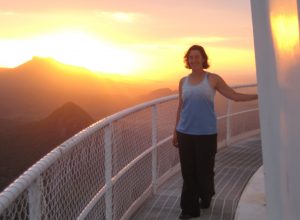 Tamara’s background is in theoretical cosmology, but since her first postdoc she’s been applying that to data… specifically large surveys of supernovae and large scale structure.
Tamara’s background is in theoretical cosmology, but since her first postdoc she’s been applying that to data… specifically large surveys of supernovae and large scale structure.
She’s really excited that with DES we are measuring a few thousand supernovae, compared to the just 52 that the two original teams used to make the discovery of dark energy that won them the Nobel Prize. With so much data we can go further than just tracing the expansion history of the universe (and testing dark energy) but also look at the magnification of the light from the supernovae to see the effect of the structures along the line of sight. In combination those let us test new theories of gravity that try to improve on Einstein’s general relativity.
Potentially even cooler, we’re monitoring hundreds of supermassive black holes at the centres of active galaxies across the last 12 billion years of the universe. Watching how these change over the five years of DES will let us weigh them, and see how these supermassive black holes have evolved.
We asked Tamara a few more questions — here’s what she had to say:
What is your favorite part about being a scientist?
Do you have any hobbies or play any sports?
If you weren’t a scientist, what would your dream job be?
Any advice for aspiring scientists?
Technical competence is essential… learn maths, physics, coding. But it’s not enough, so remember to develop your other skills as well… teamwork, leadership, public speaking, writing, and generally enjoying life!
Also, don’t stress about whether you’ll be able to do it forever. Being a scientist is a privilege, and I’m grateful for every moment I get to follow this passion — even if I have to move on from research to work on something else exciting later on.